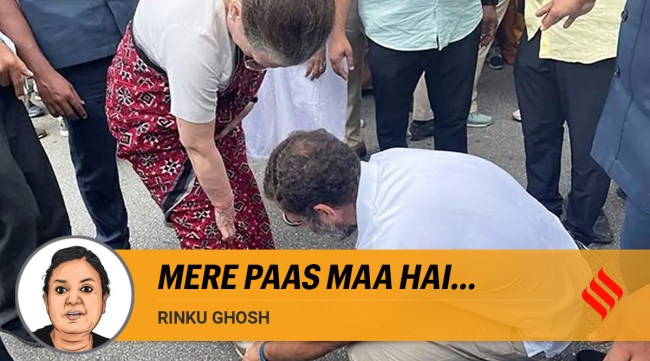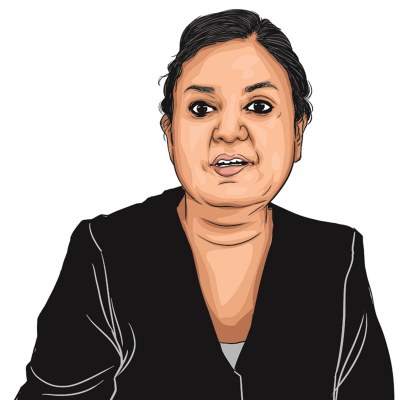Opinion Mere Paas Maa Hai…
Come to think of it, most politicians have used the maternal plot twist to win people’s trust and enhance their social standing as a family man or woman, that unquestioned qualifier of public acceptability.
 Congress leader Rahul Gandhi ties the shoelaces of his mother and party interim President Sonia Gandhi during the party's 'Bharat Jodo Yatra', in Karnataka's Mandya district (PTI Photo)
Congress leader Rahul Gandhi ties the shoelaces of his mother and party interim President Sonia Gandhi during the party's 'Bharat Jodo Yatra', in Karnataka's Mandya district (PTI Photo) There’s something redemptive about the public flaunting of our “mom status” that absolves us of all the guilt of not doing enough for our birthing parent as we ought to have. Or of not living up to expectations. That’s why when Gandhi scion Rahul bent down to tie the shoelaces of his mother Sonia during his Bharat Jodo rally — publicly documenting the frame as “Maa” — the image of a dutiful son was meant to be a reconstructive surgery for his political failings and inability to helm the Congress the way his mother had so far. In that one moment of falling at his mother’s feet, Rahul became likeable and amiable, with observers choosing to overlook his political missteps momentarily. He could be politically naïve but was a dutiful son, a suitable boy, at least one role that he had played successfully. And that one-liner from the Amitabh Bachchan-Shashi Kapoor starrer Deewar — “Mere Paas Maa Hai” — suddenly became a bankable asset for public winnability.
Come to think of it, most politicians have used the maternal plot twist to win people’s trust and enhance their social standing as a family man or woman, that unquestioned qualifier of public acceptability. So, we have had none other than Prime Minister Narendra Modi not only crediting his welfarist schemes to his hard-working mother but visiting her from time to time in public gaze to show that he doesn’t fight shy of familial responsibilities or deny her the rightful place in his life and work. This moment of vulnerability translates into his political capital. Delhi Chief Minister Arvind Kejriwal doesn’t hide the fact that he sees his mother every day. Women politicians have consistently used their role as mothers to convince their voters of their humanistic and multi-tasking abilities, as a nurturer of their collective destiny.
But aren’t we just as guilty of using the “mom status” in our everyday lives as a tokenism? We post their “then and now” pictures every Mother’s Day on our social media profiles but do we maintain the thread in our lived realities? Chances are we will mostly be answering “no.” Some of us may be living with them but how many of us have held their saree pleats together, dismissively thinking they have a practised ease about wearing a drape and would not need our help? Have we ever thought that they might be struggling with their arthritic fingers? Yours truly here is equally guilty in this department, taking her help in patting down the saree pleats together but assuming that she would manage on her own. Unlike me, she’s been wearing sarees 24X7, lulling me into a false sense of her self-confidence. Truth is, she really doesn’t manage very well without assistance but she’s too proud to ask for it. Just as I am blinded by a false sense of her invincibility despite her advancing years. Being more worried about ageing fathers and their attendant health complications, we forget that our mothers under-report their pains, simply because they want to protect us from worrying too much.
Sometimes we may be physically present around our mothers but become emotionally unavailable for their fears and anxieties, categorising them as whims and sulks of old age. Yet, we will drag them to a family event to prove our worth as her children.
Perhaps it is convenient for us to posit ourselves as children as somehow it would imply that we have not quite grown up or never will and can be excused for our wrong-doings and neglect. And by forcing the mothering upon them, which they happily accept, we have an escape chute. Because as eternal caregivers, mothers do not want to pass on the burden of responsibility to their children or expose their shortcomings. How then are we any different from our politicians, celebrating the “mom status” as a calling card but never upgrading their status in our bubble-wrapped reality?



